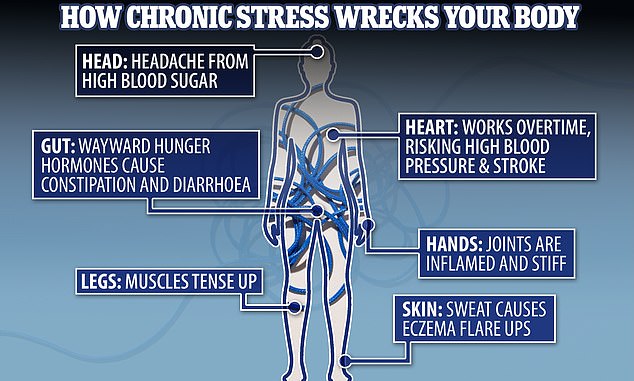A woman has revealed how quitting multitasking helped tackle the chronic stress that she feared would be the death of her.
In a recent video posted on her TikTok account @itsmillyevans, Milly Evans, a sex educator from Margate in England shared she was once ‘clinically stressed’.
It got so bad she was signed off sick from work and developed ‘multiple disabling chronic illnesses’, she shared in the clip that has amassed over half a million views.
‘To be honest I was convinced that stress was going to be the thing that one day killed me,’ she said.
But now she says she’s ‘one of the calmest’ people she knows, in large part thanks to stopping multitasking.
‘I get it people’s lives are so busy, and people are obsessed with optimising what they do, but you have no idea how bad multitasking is for your brain,’ she said.
It’s asking your brain to do too many things all at once ‘and it just can’t process that’, she explained.
And many people can do it without even realising, she warned, by using two screens at once like simply scrolling through your phone while watching a film.
Experts have warned of the dangers of ‘media multitasking’ that can even include internet browsing while listening to music.
Previously scientists worryingly found multi-tasking can shrink the part of the brain that processes emotion.
Those who used multiple media devices at the same time had less ‘grey matter’ in the brain, which is responsible for controlling movement, memory and emotions.
Nevertheless, hundreds of social media users commented on the video, saying they are reluctant to give it up.
One user wrote: ‘What if it’s multitasking you enjoy? I like to colour in while I watch TV or listen to audio books while cleaning.’
But another said they’ve ‘stopped multitasking when cooking’, now ‘slowly getting all the ingredients ready’ and ‘felt a huge difference’.
In fact, slowing down was the very next tip she gave to tackling chronic stress in the following video in the series.
She said: ‘You need to physically slow down and this isn’t me suggesting that you need to do less, keep doing what you’re doing, just try doing it a tiny bit slower.

‘You might think like I did that doing everything quickly is just being efficient and we often get praised for it, especially at school and work occasionally even on social media.
‘But it’s one thing to do some things quickly and another thing to rush through every moment of your day.
‘When you’re always in a rush, always in a hurry, from the moment you wake up to when you go to bed you are constantly telling your body there is this urgency.’
For example, she says in the past she’d rush everywhere rather than ‘slowing down’ and ‘taking in the surroundings’.
Her second example was food. ‘I love food, I look forward to it all day, it’s a moment of enjoyment and yet I often rush through it like so many of us do,’ she said.
And finally, she said slowing down to get ready in the morning and for bed in the evening helped her feel much calmer.
In the comment section, social media users shared they related to feeling this stressful sense of urgency.
One user commented: ‘I call it “false sense of urgency” and I work really hard not to fall into the trap of thinking it’s real. It’s tough.’
Share or comment on this article:
Woman who struggled with chronic stress shares the new habit she credits for changing her life
